Kelly Jensen's Blog, page 143
June 10, 2013
Female Sexuality in YA Fiction: Exploring the Range of Experiences
I've been thinking about female sexuality and sexual experience in YA fiction. Two recent posts have had this thought in my mind even more so lately, so I encourage you to take some time to read through this post about the big tropes we see when it comes to girls and sex in ya over at YA Highway and then follow it up with this post about the way we talk about sex and sexual experience when it comes to female characters in YA by E. M. Kokie. Follow up that reading with this post by Malinda Lo about sexual experience in the teen years for further thoughts on the idea of what may be natural and what may be “cringe-worthy.”
I think it's inappropriate when the sexual experiences explored in YA are about the way the story makes the adult reader feel when they read it. In other words, it's uncomfortable to have sex in YA be there for the audience's enjoyment. It should be authentic to the story and to the character. That's part of where my problems with what's being published as "new adult" come about -- many of these stories feel like a means of adult enjoyment of very young sexual experiences. This isn’t to say there shouldn’t be takeaways or reflections upon those sexual scenes in YA for readers. There should be. It just shouldn’t be for the enjoyment of the reader.
If it's real to the story and the characters, sex and sexual experience belongs in YA. I believe this to be exceptionally true when it comes to the female sexual experience because I think that for a long time (and still now), we do a lot of disservice to female characters. Too often, as Kokie points out, the scenes fade out. Or we don't read/see/use terminology in a way that is true or real. A lot of that has to do with the fact as a society, we're too willing to ignore what it is a female actually experiences during sex. More so if it is a teenage girl (because in many ways, we devalue teen girls in general -- that’s another post for another day).
When I do read a sexual experience in YA and I find that the tropes pointed out in the YA Highway post emerge again and again. And often, they're paired with some things that leave me feeling like we're continuing to send sometimes-sad messages to readers. What are those messages, exactly?
We show girls who are afraid to experience sex. They're maybe emotionally prepared, but they mentally remind themselves, for better or worse, that it's going to be painful or it's going to be hard. Rather than allow them to actually experience sex, the girls are reminded that sex is going to hurt and that they are there to be there for their partners -- I'm talking about heterosexual partnerships here, since that is primarily where I am reading these stories.
Her body is not there for her enjoyment. Her body is just part of the process. Much of this, I think, comes because this is what we’re taught socially again and again. These messages pervade our culture and come through the literature, as well. Yes, it can often be authentic to the character. But in many cases, it feels like an easy way around exploring the depths of experience that a female character can have sexually. It can be uncomfortable, but I think it’s important.
A Missing Element of Sexual Experience
I recently read Laura Nowlin’s If He Had Been With Me. On the whole, it’s a solid and good read about relationships and how they shift and change as people grow up. But it was those moments where sex entered the story I couldn't stop thinking about why it was the main character wasn't allowed physical pleasure or why it was those unintended Messages emerged.
The story features a scene with a female character preparing to have sex for the first time with a long-time boyfriend. She was excited about it, since sex was something her friends had experienced but she hadn't yet. In that moment, she pauses mentally and reminds herself it's going to hurt. She reminds herself that she is there for his enjoyment. Her partner climaxes in the scene, but we know nothing about what she experiences physically here. I think it's in many ways true that characters (and people!) don't necessarily have a grip on what's happening to them in that moment, especially since it is a first time, but I do take issue with the fact she's conscious enough of being scared of being in pain and it hurting and being uncomfortable that she doesn't ever get the chance to actually experience sex and experience pleasure. She feels good because she did something good for someone else. She is very fixated on the fact that she is giving the boy her virginity. She gave it for him.
The character does not feel good because she enjoyed sex. She feels good because it was emotionally a big deal. There's a disconnect between the emotional elements of sex and the physical elements in a way that left me uncomfortable because it suggested that her giving her body was what their relationship needed in order to be completely satisfying. She does not get to experience her body. It is a gift for someone else.
But rather than linger on the abundance of stories which tend to do that in YA, I thought it'd be worthwhile to instead turn toward some recent reads that have had amazing and empowering sexual messages for females in the story -- and those readers who pick up the stories. While it's absolutely true and honest that in many ways sex is messy and confusing and awkward, and that the characters in these stories would experience those things (and maybe even be unaware of what their bodies are doing in the moment), I think that showcasing a range of sexuality and sexual experiences is so, so important. As Lo points out in her post, sometimes sex is very natural for a character, even a teenager. It is something they enjoy, look forward to, and don’t find confusing or awkward.
It just is.
Heroines Don’t Have to Be Virgins
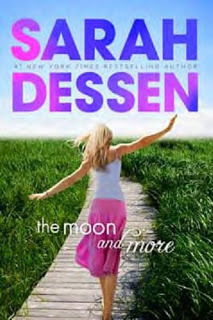
Sarah Dessen’s most recent book, The Moon and More, features Emaline, who is in a sexual relationship with longtime boyfriend Luke. Part of the joke of the story is that they have a hard time finding a place to enjoy themselves. Parents, siblings, and home construction mean that their time together alone is regularly compromised. But what's important here is that Emaline enjoys sex. She enjoys having sex with her boyfriend, and even though it's hard for them to sneak away to have their private time, it's something she's not ashamed of and it's something she's not shamed for, either. It is part of her relationship with Luke and it's part of her understanding of herself. Sex feels satisfying, and that is okay. It doesn't need to be a secret or shameful thing. It can be a beautiful, healthy, and rewarding element of a relationship. Emaline gets to still be a hero in the story and not be a virgin. She can also choose, as she does, to let go of the relationship when she needs to. Sex is not a string tying her to someone else. It doesn’t make her regret her choices. It’s just an element of what her relationship with Luke includes. It is not the whole of them.
In many ways, owning her own sexuality empowered her. I give huge props to Sarah Dessen, whose books reach so many readers -- particularly female readers -- in writing a character that can have a sexual relationship with a boyfriend and have it be so normal. There aren't weird feelings and there aren't strange and awkward encounters. Sex just is.
Newsflash: Girls Masturbate, too.
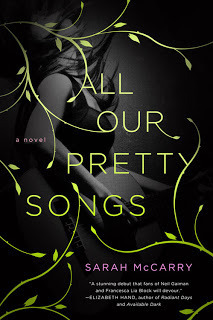 The YA Highway post above mentioned that there aren't really any YA books that talk about female masturbation at all, and I held that in the back of my mind, trying to think of books that do. And they're right -- there really aren't. Judy Blume broached the topic in Are You There God, It's Me Margaret but it's not actually on page as a thing that happens. It is, however, defined as normal.
The YA Highway post above mentioned that there aren't really any YA books that talk about female masturbation at all, and I held that in the back of my mind, trying to think of books that do. And they're right -- there really aren't. Judy Blume broached the topic in Are You There God, It's Me Margaret but it's not actually on page as a thing that happens. It is, however, defined as normal.Then I read Sarah McCarry's forthcoming All Our Pretty Songs. For the first time in memory, there was a scene where the female main character masturbates. On page. It is a very short moment, but it is a very powerful one -- the nameless main character is frustrated and longing for Jack, the music maker, and her outlet in that moment is a personal sexual experience. Reading it reminded me a lot of what happens to Marnie in the HBO show Girls: there's a lot to unpack in both situations. There was a lot of discussion of the moment in Girls after the show aired, about what it meant to see that and whether or not it was true or authentic. I'm going to be really curious what, if anything, pops up in response to McCarry's character doing something similar.
But what I think should come out is just how important that scene was to the story and to readers. McCarry's book is a very feminist novel, with very lush and moving prose, and in many ways, it's a book that's about girlhood and the mythical nature surrounding it. For there to be a scene of female masturbation on page only furthers that. I think teen readers who will pick it up and see that self pleasure for girls is normal, that they can enjoy on the merits of exploring the way their body can feel, is immensely important. It is a normal part of growing up, it is a very normal part of adolescence (and beyond!) and it is a very normal experience to engage in and want to engage in. It is in many ways the "safest" form of sex.
All Our Pretty Songs is the first in a trilogy, and as of this point, the main character's actions and experiences are completely normal aspects of growing up. There's no shame or fear or disgust in what happens -- it's okay. I'm especially fond for the fact that in this book, which does explore those lines of magic and mystery of girlhood, a girl masturbates and it's in a way that's very real to her and to the story. Where there is a story of myth, it's grounded in those moments of realism. Those real moments bring girlhood back to our world.
If you haven’t spent time on The F Bomb blog -- a feminist blog run by and for teenage feminists -- I suggest you do, and I suggest starting with this post on the topic of solo sex for girls. Seeing this moment in McCarry’s book reminded me of what the teen blogger said, and I think it resonates: “[G]irls would gain so much confidence by understanding that THEY are in charge of their sexual pleasure, not men, which would also show girls that they don’t need to have sex for approval. Don’t get me wrong, people will still have sex (and should if that’s what they want to do), but it will be because they want to have sex for themselves, not because society is telling them it is the only way they can have pleasure and feel accepted.”
Seeking Sex Doesn’t Make Her Easy Nor Worthless
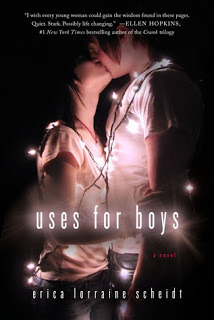
Part of what led me to want to read McCarry's book was her stunning piece about the sex in Erica Lorraine Scheidt's Uses for Boys. I really dug Scheidt's book, partially because it was so much about Anna's discovery of self through her sexual relationships -- in many ways, those relationships were painful to read, as she was assaulted, as she was made to feel used, as she never quite felt emotionally fulfilled in the way she needed to be. But the responses that McCarry points out are ones I saw again and again and wondered about myself. Why was Anna worthless because she was sexual? Why was who she was at her core without value because so much of her life was about sex.
That was the point.
Scheidt's book is a look at female sexuality and what it is and is not. Anna seeks it out because that's what she'd been taught to do by her own mother. It's what messages she'd been shown over and over again: if she has sex with a boy, she is good. But it backfires on her in many ways, though there are light moments where the sex in the book becomes something different. In those moments, she's there and she's realizing the value of her body. That she can enjoy sex and enjoy physical pleasure on the merits of that and that alone. That it need nothing more than that.
Readers walking away with the idea Anna is a slut is why, I think, we need more books that showcase female sexuality in its wide and varied forms.
Her Body Can Feel Good
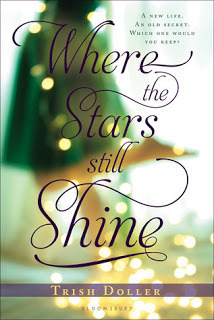 A few other books have caught my attention when it comes to showcasing female sexual experience in a really positive, affirming, and empowering manner. I know it's unfair to talk about books that aren't out yet, but I am going to anyway -- it's a means of putting them on the radar as books worth anticipating because they do something right.
A few other books have caught my attention when it comes to showcasing female sexual experience in a really positive, affirming, and empowering manner. I know it's unfair to talk about books that aren't out yet, but I am going to anyway -- it's a means of putting them on the radar as books worth anticipating because they do something right.Trish Doller's Where the Stars Still Shine comes out in September, and it's a story about a girl who has been kidnapped by her mother and has experienced a number of terrible things at her mother's hands. When Callie's returned to her father, she meets a boy named Alex. He's everything she could ever want in a guy because aside from being good looking, he really and truly cares about her.
Early on in their relationship, when Callie begins revealing her past to Alex, they becomes more physically intimate. But it's not about Alex here -- it's about Callie. He performs oral sex on her, and does so in a way that empowers her and allows her to regain power and control over her own body and her own sexuality (this is important to the bigger part of the story, which I leave out because it's too much a spoiler). From the book:
I'm scared and shaking so hard and he keeps asking me if I want him to stop, but I don't want him to stop. Then he touches me with his mouth and I melt.
When his body finally moves up over mine, my cheeks are damp with tears because I never believed it could feel good or that I would like it. Right now, in this moment, the absence of shame is shaped like Alex Kosta and I don't want to let go of this feeling.
What I think is so important in this scene is that Callie admits to her own fear, but then she is very open about how good she feels. Not just emotionally, but physically, too. Her body feels good and her body can feel good.
In many ways, what Callie experiences in this scene is reminiscent of what happens to Sloane in Courtney Summers's This is Not a Test. Where Sloane had experienced physical abuse and lost agency over her own body (which emerges not only in her devaluing of herself and her eagerness to die, but in many observations she makes of other people, including Grace and how much she envies Grace's body), it's when Rhys is physically intimate with her she has a moment of realization that her body can feel really good. That even though she's never been allowed to feel that way before, the possibility exists. And she likes that.
It's a small moment in a much larger story, much like Doller's, but those small moments of recognition of the power of physical pleasure and intimacy and ownership of those things are so important for readers -- and the characters -- to see.
Carrie Mesrobian's forthcoming Sex & Violence is another one that does something strong with female sexual empowerment, even though the book is told through the eyes of a guy. There's a girl in the story named Baker who challenges Evan because she's very conscious of -- and confident in! -- her sexual nature. She straddles him. She turns him on. She reminds him that he has weaknesses in his own sexuality because of who he is and because of biology itself.
C. K. Kelly Martin is another author who has offered up very sexually empowered female characters, too, and she's written some incredibly healthy sexual scenes, especially in My Beating Teenage Heart. Though the moments come through the voice and perspective of the male character, it’s clear that the female is experiencing pleasure and valuing what it is her own body can do.
Further Thoughts
I've only touched the surface on books that feature female sexual empowerment, but it's something I've been thinking about a lot, and it's something I hope other people weigh in on here. I am thrilled to see more books that showcase the wide range of sexual experiences and possibilities for female characters.
We DO need those books like Nowlin's above because there are teens who will have first and fifth and thirtieth times where their own physical pleasure isn't so much about the physical moment but about the emotional ones.
We DO need books that explore the value of virginity and what it means to remain pure (either for religious reasons or personal convictions).
We DO need books that don't touch sex at all.
But, we also need books that show female characters experiencing and enjoying physical pleasure. We need books that show it can be empowering. That it can be good. That it can be done alone or with a partner. That it can be safe and that it can be a valuable part of a relationship -- whether it's a relationship that's long term or one that's not.
Just like we need a wide variety of female characters in our stories, those who are easy to like and those who are challenging, we need this variety of sexual exploration in YA, too. It’s honest to the world around us, and it’s honest to readers who deserve to experience via those characters the range of possibilities that exist. That remind them their bodies are their own, and they have the power to do with them what they wish to. That enjoying them is nothing to be ashamed or afraid of.
So I'm curious -- what other books have stood out to you for how they portray female sexual experiences? I'd love to know the good side and the other side, and I'd love to know what moments stand out to you for being surprising or refreshing to see.








Published on June 10, 2013 22:00
June 9, 2013
So You Want to Read YA?: Guest Post from Colleen Mondor (Blogger & author)
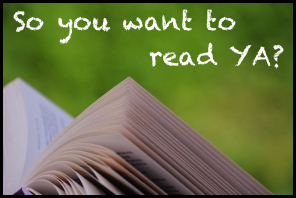
This week, let's hear what blogger and author Colleen Mondor has to say are her must read YA picks for "So You Want to Read YA?" Get ready: she's got non-fiction picks, too.

Colleen Mondor has been the YA columnist for Bookslut for seven years. She also reviews adult titles for Booklist, writes about aviation for Alaska Dispatch and is the author of the flying memoir The Map of My Dead Pilots: The Dangerous Game of Flying in Alaska. She tweets @chasingray.
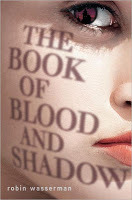 Whenever Iʼm asked about adults reading YA, I always feel like I donʼt have enough information. I need to know a readerʼs specific interests in order to best recommend a YA title they might enjoy. If you like Stephen King, then I suggest Libba Brayʼs The Diviners (with the caveat that she writes endings much better), for a straight up thriller with historical overtones (not Dan Brown, not Dan Brown!), Robin Wassermanʼs The Book of Blood and Shadows should keep you riveted. Mystery fans need to take a look at Soho Pressʼs new YA mystery line; they know what theyʼre doing with mysteries better than just about anyone and are bringing that expertise to teen titles. (So far Iʼve found the upcoming Deviant by Helen FitzGerald to be especially compelling.)
Whenever Iʼm asked about adults reading YA, I always feel like I donʼt have enough information. I need to know a readerʼs specific interests in order to best recommend a YA title they might enjoy. If you like Stephen King, then I suggest Libba Brayʼs The Diviners (with the caveat that she writes endings much better), for a straight up thriller with historical overtones (not Dan Brown, not Dan Brown!), Robin Wassermanʼs The Book of Blood and Shadows should keep you riveted. Mystery fans need to take a look at Soho Pressʼs new YA mystery line; they know what theyʼre doing with mysteries better than just about anyone and are bringing that expertise to teen titles. (So far Iʼve found the upcoming Deviant by Helen FitzGerald to be especially compelling.)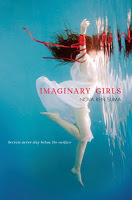 And as for paranormal, and you canʼt discuss YA without bringing up paranormal, Nova Ren Sumaʼs Imaginary Girls continues to haunt me. There is a relatively conventional ghost in the plot but more disturbingly, there is a sibling relationship that is utterly and completely devastating. Itʼs not quite “Baby Jane” levels of terrifying but Suma does a masterful job of ratcheting up the tension in this one that will impress any reader.
And as for paranormal, and you canʼt discuss YA without bringing up paranormal, Nova Ren Sumaʼs Imaginary Girls continues to haunt me. There is a relatively conventional ghost in the plot but more disturbingly, there is a sibling relationship that is utterly and completely devastating. Itʼs not quite “Baby Jane” levels of terrifying but Suma does a masterful job of ratcheting up the tension in this one that will impress any reader.Having shared all of those novels, the easiest go-to list for me when it comes to any adult seeking YA is nonfiction. I have made it a practice of several years now to gift such titles to adult family members and they have never been disappointed. Because my great grandmother worked in the garment industry in NYC in the early 1900s, I gave my mother a copy of Flesh and Blood So Cheap by Albert Marrin a few years ago. For my aunt, a huge John Lennon fan, this year Iʼll be buying Yoko Ono: Collector of the Skies by Nell Beram and Carolyn Boriss-Krimsky.
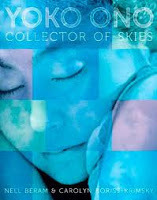 Other recent titles I have gifted are Tracking Trash by Loree Griffin Burns, and The Bronte Sisters and Jane Austen: A Life Revealed, both by Catherine Reef. All of these books are notable for their attention to deal, factual accuracy and outstanding illustrations (mostly photographs). They do not talk down to their intended audiences, but rather inform in an entertaining manner, something that is appealing regardless of the age of the reader. For adults who want to learn a bit about a subject (such as the Triangle Fire), but not plow through hundreds of pages, these type of books are ideal and I think an excellent place for curious adults to take a look at YA.
Other recent titles I have gifted are Tracking Trash by Loree Griffin Burns, and The Bronte Sisters and Jane Austen: A Life Revealed, both by Catherine Reef. All of these books are notable for their attention to deal, factual accuracy and outstanding illustrations (mostly photographs). They do not talk down to their intended audiences, but rather inform in an entertaining manner, something that is appealing regardless of the age of the reader. For adults who want to learn a bit about a subject (such as the Triangle Fire), but not plow through hundreds of pages, these type of books are ideal and I think an excellent place for curious adults to take a look at YA.Ultimately, I think readers should look in YA for the same sort of books they enjoy in adult. My only precaution would be against romance, a genre I have personally found to be very difficult for me navigate in this age range. But really you just have to look for what you like here, as you do elsewhere and when all else fails, head to nonfiction where I promise you wonʼt be disappointed!







 Related StoriesSo You Want to Read YA?: Guest Post from Daisy Whitney (author of When You Were Here)So You Want to Read YA?: Guest Post from Author Kody KeplingerSo You Want to Read YA? Guest Post by Amy Stern, Literary Agent
Related StoriesSo You Want to Read YA?: Guest Post from Daisy Whitney (author of When You Were Here)So You Want to Read YA?: Guest Post from Author Kody KeplingerSo You Want to Read YA? Guest Post by Amy Stern, Literary Agent
Published on June 09, 2013 22:00
June 7, 2013
Links of Note: June 8, 2013
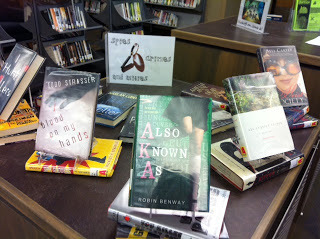
One of my recent displays at work, which was completely emptied out just a week later.
My teens LOVE mysteries, espionage, and thrillers.
Since last week I was out of town, I didn't get a chance to do a proper Links of Note. But I'm going to do my best to cover everything I've read recently I think is worth sharing. It's a little light because I haven't been around the blog world catching up quite yet, so if there's something I must see, let me know in the comments.
Literopathy: it's like Dear Abby but for people who want their therapy via book lists. I love this idea, and I love book list compilations, period.
What's it like being 13 in the year 2013? This feature from Australia is fun and enlightening for anyone who works with or loves teenagers. There is a video, but it's worth watching.
Have I talked about my enjoyment of Michael Cart's pieces covering genre? Here he is talking about "New Adult" books and what might fit the category. I'm really glad to see graphic novels included in his list because I think if "new adult" really is a thing, the graphic novel format -- especially graphic memoirs -- is where a LOT of books fitting the need are falling.
Gwenda Bond has a really interesting and thorough post about book packaging, including how it works, who gets involved with it, whether or not it's evil, and more. Worth reading for anyone who is curious about this side of the book world.
The Children's Book Council Diversity blog delves into one of my trigger topics, which is where the fat kids have gone in kid lit. This is a topic I'm considering revisiting here sometime in the near future, but in the mean time, read this post. It's spot on and important and good thought fodder.
This isn't super thorough (and one of the comments points out a huge miss), but Teen.com has a nice little piece on authors who got their starts as teenagers.
Jennifer Lynn Barnes's post about gender, the null hypothesis and privilege is out of this world good. I'm not linking to the John Green post that inspired it (you've probably read it anyway), but I love Barnes's examination of what the claims are and her willingness to call out the question she got about her initial post on the topic.
Peter Gutierrez talks about how shows like BEA contribute to the celebrity status and culture that surround some authors. This post is really interesting.
The Guardian talks about how and why gendered covers may be doing a disservice to young readers. This stems out of a conversation at Australia's Reading Matters conference.
A couple of interesting blog posts recently popped up about the role of friendship in YA fiction. There's this one and then this one. Both are worthwhile reading. My only comment to really add is that I think there are actually a lot of YA books that tackle friendship head on and do so in really worthwhile ways. But I say this as someone who has been working on a book about contemporary YA and has an entire chapter dedicated to friendship. It's there. The problem is that it's not the selling point of many books (which is hit on in those posts) and it's not as sexy a lead to readers as a romance is. I'm not sure if that's actual truth or something we're simply told and led to believe.
For fun: 12 classic books that define your summer.
Chuck Wendig talks about 25 things that you should know about young adult fiction. I really like this -- I think it's not only an excellent primer to young adult books, but I think it's a bigger primer to young adulthood more broadly.
Author Laura Lam talks about the gray areas of gender and identity.







 Related StoriesLinks of Note, 5/18/13Links of Note: May 4, 2013Links of Note: April 20, 2013
Related StoriesLinks of Note, 5/18/13Links of Note: May 4, 2013Links of Note: April 20, 2013
Published on June 07, 2013 22:00
June 6, 2013
Neptune's Tears by Susan Waggoner
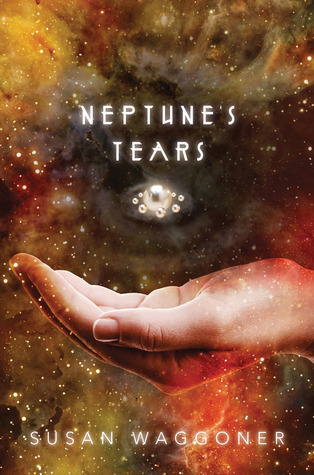
Have you ever finished a book, set it down, and thought to yourself "I liked that way more than it deserved?" Neptune's Tears by Susan Waggoner is one of those books for me. It's thin in all ways - not just page count - but it doesn't stop the concept from being cool, and sometimes that's enough for an enjoyable read.
Seventeen-year-old Zee lives in London in 2218. She's training at a hospital to be an empath, a career choice that is still relatively new for her time. She has to be careful not to form any close emotional relationships herself, as it would interfere with the work she does helping patients repair their own emotional well-being.
But then. (You knew this was coming, right?) She meets a boy.
He's not just any boy. He's an alien - a very human-looking alien, but an alien nonetheless, one of a race who landed several years before and have managed to assimilate rather well. Actually, the first encounter was a bit of a letdown for most people, as the aliens themselves didn't seem to have much of a plan other than studying Earth. Zee's father remains convinced that the aliens have other intentions, and it's made him obsessive and distant.
While the aliens didn't bring much strife, Zee's future world is far from utopian (though this is emphatically not a dystopia). It's plagued by anarchist terrorists who set off shock bombs without warning and kill swaths of people at a time - without even realizing they've been hit. And the world is divided on the aliens, of course. Zee herself is resentful of them due to the way her father reacted to them, so her attraction to handsome alien David is very unwelcome.
And yet, she can't help but seek out his company, and the two fall in love. Then it becomes clear that David has a few secrets, and Zee's empathic powers begin to grow stronger and morph into something newer and rarer. Everything culminates in a deadly anarchist attack, when Zee learns the secrets David has been hiding and her world is upended.
There's a twist at the end, and it's abrupt and unexpected, barely telegraphed at all. It also leaves the book on a bit of a cliffhanger, though many readers probably won't care (that it's unresolved or enough to read a sequel, to be honest). It also makes the book about something completely different than initially expected (in much the same way that the twist in R. J. Anderson's Ultraviolet did. Readers may have the same feelings about it, too - either very excited or very betrayed).
This is a short book, and it suffers for it, I think. Characterization is pretty thin, and the plot doesn't go much of anywhere (until the very end, of course). I wouldn't call it a frothy, fun read either, though. It's just a bit dull, despite the intriguing premise.
That said, I certainly enjoyed it. The short length helped, as I didn't have much time to get bored before I had finished it. And I really dug Waggoner's ideas, though they weren't executed particularly well. I like the idea of empaths as healers in a science fiction rather than a fantasy setting. There are also a few intriguing details of this future world sprinkled throughout, including a lovely background story that explains the title. Even the anarchist terrorists seem a bit different from the usual fare with their choice of weapon. Little bits like this hint at real creativity and a story that never really comes into its own.
Review copy received from the publisher. Neptune's Tears will be published June 25.







 Related StoriesAbsent by Katie WilliamsWhen You Were Here by Daisy WhitneyThe Girl Who Was Supposed to Die by April Henry
Related StoriesAbsent by Katie WilliamsWhen You Were Here by Daisy WhitneyThe Girl Who Was Supposed to Die by April Henry
Published on June 06, 2013 22:00
Let's start a Riot!

I know I haven't updated about BEA yet, and I'm not sure yet what all I have to say about it -- it was good! It was much more about the social stuff for me this year than the "getting all the things" aspect (I picked up maybe 15 books).
But I did have something else to share that sort of came out of BEA. And that's this: you know the awesome site Book Riot, focused on readers and written by those who are readers?
I'm writing for them.
My first post is up today, and it's all about my genre kryptonite. Anyone who has been on Stacked for a day or two knows my passion for dark realistic YA fiction, so that's what I'm talking about.
The best part of writing for Book Riot, aside from all of the other great things, is that it's short form, and it's a site of readers who seek out books for reading's sake. Which means, my tone writing over there can be a little different than it is here, and the pieces are much briefer. It's a really nice opportunity to branch out and talk in more places about books and reading. Nothing will change at Stacked, as I love having this space and I love and appreciate everyone who stops by to read or shares what we do here.
I like to think of it as fulfilling my dedication to getting beyond the easy reach, too, which I know I've blogged about many times before.
When my next post goes up, I'll link it up (because I wrote about one of my all-time favorite things that I have been thinking about a lot lately and is relevant to many a recent article across the internet), but following that, I'll only call out posts in the biweekly link round ups on Saturdays.








Published on June 06, 2013 18:26
June 5, 2013
Templar by Jordan Mechner, LeUyen Pham, and Alex Puvilland
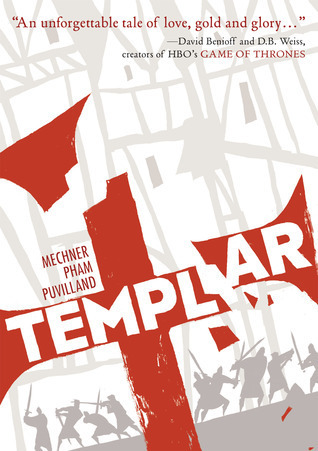
Martin is a templar knight, but he never made it to Jerusalem. Instead, he's been recalled to France, along with his fellow knights, where the pope has caved to political pressure from the king and set events in motion that would end the order. The knights have all been arrested on charges of heresy, and it's only a matter of time before Martin himself is executed, along with the rest of the order.
Instead, he manages to escape, and he sets out on the run with a few other knights who have managed to remain hidden from the clutches of the king. With the assistance of a former flame of Martin's, they resolve to keep the king from gaining the famous treasure of the Knights Templar - by stealing it themselves.
Mechner has used the history of the end of the order to set up a seriously fun (and surprisingly moving) story. Due to the length of the book, he's got time to create interesting, fully-formed characters and a fairly complex plot. I like that the search for the treasure is grounded in the actual history of the Templars and takes place in their historical period, rather than focusing on a modern group of historian-thieves. There's good camaraderie as well as bickering between the rogue knights, who are refreshingly not portrayed as lily white defenders of the faith.
I feel like Templar is a book created just for me. It's a historical fiction full-color heist story (so many things I love all in one package!) that's actually novel-length and takes more than a single afternoon to read. It's beautiful (with just the kind of art I love), it's moving, it's exciting, it's funny; it's just overall so well done, and all the time that went into its creation (as Mechner describes in his foreword) is very apparent. And it's not a complete testosterone party - Martin's ex figures prominently and is important to the story, without seeming to be shoehorned in.
It's also a self-contained story, which may entice readers who are wary or weary of the multi-volume stories so prevalent in the graphic format. The ending is a punch to the gut, both unexpected and realistic. It adds a bit more gravitas to what could be seen as a very silly story - and reminds the reader that Martin's situation was dangerous and bloody.
This should have great appeal to teens who love high-action comics. There's a little nudity, but it's blurry, drawn with steam clouds from a hot springs bath covering most of it. Highly recommended.
Finished copy received from the publisher. Templar will be published July 9.







 Related StoriesRed Handed: The Fine Art of Strange Crimes by Matt KindtAbsent by Katie WilliamsWhen You Were Here by Daisy Whitney
Related StoriesRed Handed: The Fine Art of Strange Crimes by Matt KindtAbsent by Katie WilliamsWhen You Were Here by Daisy Whitney
Published on June 05, 2013 22:00
June 4, 2013
Twitterview: Katie Williams
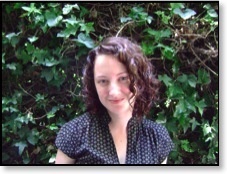
This month, we have author Katie Williams here as our Twitterview guest. We're talking about her new book Absent, about creepy YA, ice cream, and much, much more. I reviewed Absent yesterday and it's one of my 2013 favorite readers. I am going to give away a copy to one lucky winner at the end of this interview.
For now, Katie!
What inspired Absent?
Staying after hours when I was in high school. It feels strange to be in a place built for crowds when it's empty.
If you had to put a genre label on Absent, what would you call it?
A ghost story through the looking glass? Or post-death coming-of-age? I like to mess with genres.
There are ghosts in this book, and they aren't necessarily Casper-nice. What inspired the ghostly aspects of Absent?
My ghosts are facing this incredible loss. It makes them look at who they were and how they'll be remembered. They have tough moments.
What sort of research, if any, went into Absent? Feel free to link to relevant media that influenced/informed your story.
I read ghost stories to decide how I wanted my ghost world to be. Recommended
ghostly reading: here, here, here, here, and here.
Paige can "press into" anyone and BECOME them, altering their destiny (at least briefly). If you could "press into" someone, would you?
I want to say no because it's a truly unfair thing to do. But honestly, who could resist that sort of masquerade?
Who would it be and why?
See? You knew I'd say yes. Maybe not any one person, but a lot of different people, not to change things, just to walk for a bit.
Stereotyping is a big theme throughout the book. What do your characters learn about this through their journey?
Viewing others with nuance and generosity allows you to view yourself with nuance and generosity. We should do more of both.
What, if anything, should readers walk away with from Absent?
That quiet, complete feeling of having read a good story. (This is what I hope!)
If you had to give a "______" meets "_________" pitch for your book, what would you say are the 2, 3, or 4 titles it's a combination of?
Since you've asked for a Hollywood pitch, I'm going to give you movies. How about "The Breakfast Club" meets "The Others"?
Both Absent and The Space Between Trees are creepy reads. What inspires your writing in this way?
So macabre, I know! But I see them as about identity, the stories we tell about ourselves and others. And fear is a great revealer of self.
What gets you jazzed to write?
Reading good books. Taking long walks. There's also a fair bit of procrastination masked as apartment cleaning.
Who or what do you write for?
I write YA for my sixteen-year-old self.
Why YA? What's compelling about this arena to make you want to write it?
YA takes risks; it's sleek and fiery; it doesn't care what genre. Readers demand both pleasure and knowledge, in short, a damn good story.
What scares you the most about writing or the writing process?
Representing people or experiences in a reductive way.
Is there something you've always wanted to explore in your writing but have been too fearful to do yet?
I'm terrified of the 1880s setting of my current project. Our time period shapes us, and we also recognize each other across time, both.
What's been the most satisfying part of your career to date?
Hearing from readers. I also love seeing the covers because I wish I could draw.
Who are your top three writing influences?
Tops is Ursula K. Le Guin. Two others: Jennifer Egan and Kelly Link. All three take risks and trust the reader.
What was your most influential read as a teenager?
I read everything Stephen King had ever written…under my desk during class. I think my parents had to take a special meeting.
Who do you believe is breaking ground in YA right now?
Kristin Cashore astounds and amazes. All hail.
What's the best writing advice you ever received?
Read your first drafts like your sweetest friend and your final drafts like your snarkiest critic. Wisdom from writer Charles Baxter.
What's your best writing advice to give?
It's normal to feel foolish or frustrated (or both!) when you write. Be brave. Keep going. You will get somewhere true.
Do you have a writing soundtrack? Care to share some of it?
I don't. I start typing the song lyrics! But my mom says this song reminds her of Absent:
(It's pretty uncanny.)
What's next for you?
Next: Low-magic fantasy in late-1880s American West. Then: Near future science-
fiction about a teenage reality TV show.
Favorite ice cream?
Cinnamon. Try it. Trust me.
Loading...







 Related StoriesTwitterview: Sara ZarrTwitterview: Karen Healey + Giveaway of When We WakeTwitterview: Rainbow Rowell (author of Eleanor & Park)
Related StoriesTwitterview: Sara ZarrTwitterview: Karen Healey + Giveaway of When We WakeTwitterview: Rainbow Rowell (author of Eleanor & Park)
Published on June 04, 2013 22:00
June 3, 2013
Absent by Katie Williams
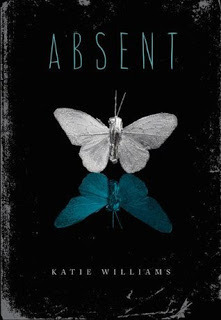
Fair warning: I plan on spoiling Katie Williams's Absent throughout the review. There isn't a good way to review this one without going into the details that make it work, so if you don't want to have the book ruined for you, come back once you finish. In short, this is a brilliant woven story about ghosts, death, grief, the afterlife, our impressions of ourselves and other people, and high school. It's tightly constructed, masterfully executed, and leaves almost as many questions for the reader to answer as it provides solutions.
Paige fell off the roof of her high school in a freak accident, and she died when her head hit the cement protective lip of the building. It wasn't the fall that killed her, but rather, the knock on her head. Now that she's a ghost and sentenced to an afterlife at her high school, she's watching in as her former classmates deal with losing her. Paige isn't alone, though -- she's there with Evan and Brooke. Evan died years ago, and Paige has no idea who he is and he isn't quite forthcoming about it. Brooke, though. Brooke is someone Paige knows well -- it was Paige's secret boyfriend Lucas who was there when Brooke overdosed in the bathroom. He couldn't save her.
Paige, Brooke, and Evan sit in on one of the grief counseling sessions (as ghosts, of course) and it's here when popular girl Kelsey lets slip that she knew Paige didn't fall off the roof. That she jumped. In no time flat, the rumor spreads throughout the school, infiltrating every social clique there is -- from the popular kids, to the burn outs, to the jocks, and more. Paige knows she didn't jump. Paige fell when she turned too quickly to see Lucas talking with her teacher (they'd been on the roof for the infamous physics class experiment of dropping an egg without it breaking). But now that this rumor has spread, Paige is questioning whether or not her death was truly an accident or whether or not her death was precisely what Kelsey said. Because who starts a rumor like that about a dead girl?
Katie Williams's Absent is magical realism. Maybe even straight-up supernatural. What happens outside of Paige, Evan, and Brooke's perspective is entirely in the real world. This is high school. There are cliques. There are classes. There are people spreading rumors about others. But what happens inside Paige, Evan, and Brooke's world is entirely in their ghost world.
So when Paige discovers that being a ghost means she can press into and inhabit the bodies of the living? Can she change the course of a rumor? Can she get to the bottom of what really caused her death? And more importantly, can she figure out that the labels she's attached to people -- burn out, jock, loser, popular girl -- are merely labels and the people are actually much more dynamic and whole than she imagined?
Whenever someone thinks of Paige, she realizes she's able to press into them. And it's her former best friend Usha she pressed into first. She's easy since she thinks about Paige a lot, and Paige is fascinated to know why it is Usha suddenly started hanging out with the weird religious kids. The ones who they'd always made fun of because they'd always come across so fake. What Paige discovers is that, while she's inhabiting Usha, she can make her say anything. She IS Usha entirely. And all she needs to do to escape from that body is walk to the end of the school property line; that's when Usha returns to being Usha and Paige is sent back to the roof to relive her death again.
It's brilliant. The ghost can inhabit the bodies of people who are alive. Paige is marveled by this and knows now she needs to continue doing this. It gives her entertainment, no matter how sick it is.
And what better entertainment than to inhabit the body of mean, popular girl Kelsey and force her to experience life as a less-than-perfect girl? The trick is that Paige has to figure out how to get Kelsey to think about her, and she knows just how to do it -- she needs to get Usha to paint the memorial mural at the high school for her and Brooke. That way, whenever anyone walks by, they think of her. It's the ideal set up.
This is a lot of explanation of plot, isn't it? But I'd like to note this book clocks in at 188 pages. And it's not at all plot-driven. It's character-driven. As Paige discovers this ghost talent, she finds herself learning that the people she went to school with -- the people she was so quick to label and judge and throw into boxes -- are actually a lot more complex than she'd ever given them credit for while alive. Readers work alongside Paige through these discoveries, and they become more and more important as she works toward figuring out the truth to her death.
One thing Paige starts discovering, though, is that some of the people she's interacting with, with whom she'd interacted with regularly in her actual life, aren't acting entirely right. Lucas, who had been her secret boyfriend (and yes, secret -- he was a jock and for her, being seen with him was the ultimate bad thing because he was a jock), starts acting erratic. He floods one of the school bathrooms. He makes out with a freshman girl on the floor in the bathroom, right where Brooke had died. Paige also realizes that Wes, who had always been a creepy druggie in her mind, is actually a sweetheart. That he actually had real, authentic, non-shy romantic feelings for her. As a ghost, Paige is torn about this. Her images of people are shattering left and right, and she can't do anything about it.
Except, this is where Williams's book becomes not just good, but excellent.
The truth of the matter is that Paige isn't the only dead person who can inhabit bodies. Turns out that Evan and Brooke can, too. When Paige mentions what she's been doing to Evan, he becomes frantic. He realizes that Brooke has been using this talent to manipulate people in the same way that Paige had been manipulating people. Worse, though. Brooke's out for revenge. Perhaps Paige didn't fall. Perhaps Paige didn't jump.
Maybe, just maybe, she was manipulated by Brooke.
Where Paige had finally come to discover not everyone is as they seem, she's also come to the moment where she realizes that there are secrets between and among people, too. That death isn't always the final answer. In other words, Paige had taken ghost Brooke at face value. Brooke had been messed up with drugs when she died, and it was Lucas who tried to save her. But it's possible that Brooke's afterlife involved a lot of jealousy of Paige and Lucas's relationship. So rather than work through it, rather than forgive what happened, rather than get to the bottom of it, Brooke sought revenge on Paige.
Absent draws upon stereotypes, drags them out, reexamines them, then pushes them back into another shape. These are incredibly complex characters working through grief and loss. Paige, for all she tells us and shows us in the narrative, isn't a princess or a great girl. She's not entirely likable. What she's doing as a ghost in pressing into other people -- in what she did to change the course of other people's futures and memories of her -- is terrible. It's awful. She's seeking out unnecessary vengeance as a ghost just because she can. There's an incredible line in the book that sort of sums this up, and it sort of sums up what Paige realizes about who she was in the real world (even if she's not entirely acknowledging her role in doing this in the afterlife, too): "They walk on, oblivious. People want to believe bad things, I tell myself, glaring around at my classroom. They want to believe the most shocking story. They see you as the worst version of yourself." And then pages later, there's Paige having this moment: "This is it. Exactly what I'd engineered, exactly what I'd said I'd wanted. How is vindication supposed to feel? It should feel like the parts snap into place. It should feel like eating a bowl of warm, thick soup on a cold day. It should feel like suddenly you're solid again."
And that's why when the moment comes and Paige learns her death was the result of Brooke seeking vindication, the story snaps into one whole and solid place. Because, despite what Brooke thought the revenge would feel like, it wasn't. It didn't change anything of what happened in her waking life. It didn't change anything except take away the life of another person. Lucas was still who he was. Wes was still who he was. Now, there was just a Paige-shaped hole in the school. And Paige learns that wasting all that time seeking revenge as a ghost wouldn't change the course of events that led her here, either. Death doesn't make sense. It shouldn't. That's why it's so painful and why grief takes as many forms as it does. For people like Kelsey, it's through rumor-spreading she deals. For people like Wes, it's reliving the drawings he made.
For Paige, for Brooke, and for Evan? It's accepting. It's forgiving. It's moving on and up.
Williams writes tightly, weaving all of these threads together seamlessly. Moreover, though, she incorporates very small details that add up to something much greater. The mural on the wall -- the one Paige manipulated her best friend to paint -- ends up playing a significant role in the story and in the resolution. But that mural is not what we as readers or Paige as a character ever suspect it is. It's much greater. It's about freedom and release and acceptance. It's about moving up, rather than being stuck.
I haven't talked a lot about why these three characters are stuck here, but it's important. The three of them were suicide victims. There's a small line early on about how being stuck in high school for eternity was like purgatory. The characters are forced to relive high school every single day. They're forced to remember their stereotypes, their boxes, their moments of winning and their moments of losing. They're forced to accept they can and will eventually be forgotten.
Because that's Evan's story.
Absent could be described, I think, as Lauren Oliver's Before I Fall meets Nova Ren Suma's Imaginary Girls. Readers who dug either or both will like this. In some ways, Williams's book reminded me a lot, too, of the Korean horror film Whispering Corridors -- there are many similar elements about social status and death, though, as well as revenge. I think fans of J-horror would dig this because of the ghosts seeking revenge (and the brilliant prose in this book -- there is a moment when a character off-handedly asks if there are ghosts in Japan and if they were the nice or not nice kind, which anyone who has ever seen J-horror knows the answer to). How scary is it to think about your body being inhabited by a ghost? How scary is it to think that something outside ourselves could be determining the course of our future?
This book, of course, is about how we are entirely in control of determining our future. But oh, how it gets there is so savvy, so slick, and so twisted. Absent takes what Williams did so well with building a mystery and a set of questionable characters in The Space Between Trees and imbues it with the sort of ghost story I love so much. Even though this is a short novel, it is not fast-paced nor should it be read that way. Take your time with this one because there is a lot to absorb.
Absent is available now from Chronicle Books. Review copy received from the publisher.







 Related StoriesWhen You Were Here by Daisy WhitneyThe Girl Who Was Supposed to Die by April HenryWild Awake by Hilary T. Smith
Related StoriesWhen You Were Here by Daisy WhitneyThe Girl Who Was Supposed to Die by April HenryWild Awake by Hilary T. Smith
Published on June 03, 2013 22:00
June 2, 2013
So You Want to Read YA?: Guest Post from Daisy Whitney (author of When You Were Here)
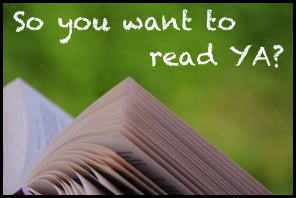
Today's guest post for our "So you want to read YA?" series comes from author Daisy Whitney!
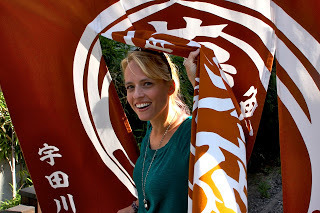
Daisy Whitney reports on television, media and advertising for a range of news outlets. She graduated from Brown University and lives in San Francisco, California, with her fabulous husband, fantastic kids, and adorable dogs. Daisy believes in karma and that nearly every outfit is improved with a splash of color. She is the author of The Mockingbirds novels, and is also the author of Starry Nights, coming in Fall 2013. Daisy invites you to follow her online at DaisyWhitney.com.
The big blockbuster teen series have lured millions of new readers to young adult literature, but if you’re new to the genre, it can be daunting to know what to read beyond The Hunger Games, Beautiful Creatures and, of course, Twilight.
Especially because young adult literature is all that and a whole lot more.
Many of my mom friends -- gasp, they’re not teens! -- have read these series and are eager for more young adult books, so have turned to me for recommendations.
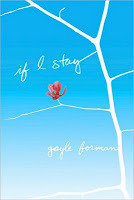
My “gateway drug” to the bounties of teen lit for anyone who has devoured the big series is Gayle Forman’s If I Stay.
Fine, fine. Everyone loves that book, and everyone recommends it. That’s because it’s amazing and crosses over from teens to adults. Its sequel, Where She Went is as heart-wrenchingly beautiful and hopeful as the first story.
Beyond that, several other titles that I lean on to lure new readers to YA include Sherman Alexie’s The Absolutely True Diary of a Part-Time Indian, Dana Reinhardt’s The Things a Brother Knows, E Lockhart’s Disreputable History of Frankie-Landau Banks, Trish Doller’s Something Like Normal, Melissa Walker’s Unbreak My Heart, Stephanie Perkins’ Anna and The French Kiss, Holly Black’s Curse Workers trilogy, Laini Taylor’s Daughter of Smoke & Bone, Amy Plum’s Die For Me, Barry Lyga’s Boy Toy, Kendare Blake’s Anna Dressed in Blood, Chris Lynch’s Inexcusable, Cynthia Omolulu’s Dirty Little Secrets, Jandy Nelson’s The Sky is Everywhere and anything by Courtney Summers.
But I wouldn’t recommend all these books to every reader.
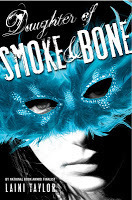 For starters, a book like Sherman Alexie’s The Absolutely True Diary of a Part-Time Indian is the sort of coming-of-age with humor-and-pathos story that you can put in anyone’s hands.
For starters, a book like Sherman Alexie’s The Absolutely True Diary of a Part-Time Indian is the sort of coming-of-age with humor-and-pathos story that you can put in anyone’s hands. Daughter of Smoke & Bone is an exquisite novel and a masterfully wrought tale of love and war, and everyone I have recommended that book to from my mother-in-law to friends to my age to teens has adored it.
For smart girls, and the boys who love them, I like to recommend E. Lockhart’s The Disreputable History of Frankie Landau-Banks. Witty, clever and anthemic, I haven’t met a reader of this book who doesn’t count it as tops on their list of best books.
Then there is Holly Black’s Curse Workers trio. It is quite sophisticated and is usually a hit with readers who enjoy mysteries, plot twists, and heist-style stories. If your new YA reader is an Ocean’s Eleven fan -- give them Curse Workers!
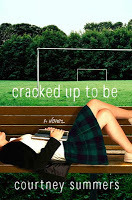 For readers who want an intense, literary story, that’s when I’d hand them a Dana Reinhardt book, Barry Lyga’s Boy Toy or Chris Lynch’s Inexcusable, which packs such a punch, but is also a gorgeously written story and a wonderful example of an unreliable narrator.
For readers who want an intense, literary story, that’s when I’d hand them a Dana Reinhardt book, Barry Lyga’s Boy Toy or Chris Lynch’s Inexcusable, which packs such a punch, but is also a gorgeously written story and a wonderful example of an unreliable narrator. Anna Dressed in Blood by Kendare Blake combines mystery, a touch of romance, and a whole lot of suspense, along with gore and ghosts. Make sure the reader likes blood and guts with their stories, but if they do give them this book. On a side note, I’m a complete scaredy-cat, but I devoured this novel and its sequel.
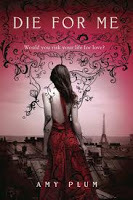 I would easily talk up Courtney Summers to any teen. Her novels are all hard-hitting, and they are all amazing. I am continually awed by her mastery of subtlety and intensity at once. Another edgy novel -- and this one works for 12 and up readers -- is Cynthia Omolulu’s Dirty Little Secrets, a fast-paced story about a girl whose mother is a hoarder. For a bit of hard-won truth and romance in the same place, turn to Trish Doller’s Something Like Normal.
I would easily talk up Courtney Summers to any teen. Her novels are all hard-hitting, and they are all amazing. I am continually awed by her mastery of subtlety and intensity at once. Another edgy novel -- and this one works for 12 and up readers -- is Cynthia Omolulu’s Dirty Little Secrets, a fast-paced story about a girl whose mother is a hoarder. For a bit of hard-won truth and romance in the same place, turn to Trish Doller’s Something Like Normal. Now, if you haven’t read a Stephanie Perkins romance, you are missing out because she is the Princess of YA romance. Her novels are deep, rich and achingly romantic. Likewise, give Melissa Walker’s books to Stephanie Perkins’ fans, and for readers who want a bit of the supernatural, add in Amy Plum’s Die For Me. I simply adored that book. Last but not least, I don’t know a single girl or woman who hasn’t fallen in love with Jandy Nelson’s The Sky is Everywhere.
***
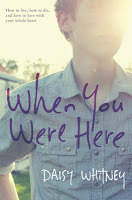
Daisy Whitney's When You Were Here comes out tomorrow.







 Related StoriesSo You Want to Read YA?: Guest Post from Author Kody KeplingerSo You Want to Read YA? Guest Post by Amy Stern, Literary AgentSo You Want to Read YA?: Guest Post from Author Cecil Castellucci
Related StoriesSo You Want to Read YA?: Guest Post from Author Kody KeplingerSo You Want to Read YA? Guest Post by Amy Stern, Literary AgentSo You Want to Read YA?: Guest Post from Author Cecil Castellucci
Published on June 02, 2013 22:00
BEA Part 1: Blogger Con
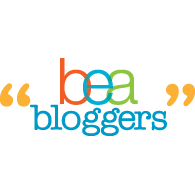
I'm going to break up my BEA posts a little and share them throughout the week, but I do want to start at the beginning with Blogger Con. As you might remember, I was invited to speak on a panel called "Book Blogging and the Big 'Niches'", which was an honor.
The day began with a little bit of a travel problem -- the shuttle supposedly going to Grand Central Station never showed up -- and then when I got to the place I was to report, no one was there to meet me. After both of those things were taken care of, I met up with Leila and we grabbed spots for the opening keynote speaker, Will Schwalbe. After we stood in line for getting "stuff." Maybe it's just me, but beginning the blogging con with "grab stuff you want," sends an interesting message.
What began as a sort of bland talk about how much book bloggers have saved the book industry (which I don't know I agree with) actually became a very frustrating keynote to listen to, as Schwalbe suggested that the role of book bloggers is to play the role of cheerleader. We're to think of the people behind the books -- the writers, the editors, the publishers -- and in doing so, be careful what it is we choose to say because our words have power. While he called out snarky reviews as problematic, he never once broached the topic of critical reviews, choosing instead to talk about the value of being positive and cheering books and their creators.
This to me is exceptionally problematic, especially as a way to tie into the con more broadly. I think it's very important to talk about the things you love, but I also think it's important to remain true to yourself and what it is your goals are as a blogger. Me? I love being critical. I don't use my platform as a means of being a cheerleader. I use it to talk both about the things I like and the things that make me go hmm.
Of course, part of Schwalbe's talk circled back to his own book, and he made some interesting parallels between book blogging and book clubs, which to me don't equate. It felt in many ways that blogging was reduced to one purpose, which was to continue helping the industry (remember his talk began with the grand statement about how bloggers have saved publishing). While I appreciated that Schwalbe talked with three bloggers to inform his talk, he didn't really offer much more than to say we're cheerleaders and that left a sour taste in my mouth. I wondered then and still wonder how this talk would have been structured had it come from a blogger who completely gets what bloggers set out to do (spoiler: bloggers do a lot of neat, different, various things -- some cheerlead, some criticize, and there is room in this world for all of our unique interests and passions).
So to say things started off disappointing is an understatement. The take away of "be nice" doesn't sit well with me. "Be respectful?" That would have been a much different -- and worthwhile -- takeaway for me. You don't automatically get nice, but you do automatically get respect.
Following the keynote, I attended a session called "YA Editor Insights," which featured three YA editors -- Cheryl Klein of Scholastic, Deb Noyes of Candlewick, Emily Meehan of Disney-Hyperion, and Jen Doll of the "YA for Grownups" series in The Atlantic (long time readers know my thoughts on this series). While I like Buzz sessions, this panel was not billed as that, even though that is all it became. There was nothing about blogging and the impact it has had on editing or acquisitions or on publicity -- anything relevant. It was about what books were coming out, and it even included a cover reveal. So while that was interesting, it was incredibly disappointing to be sold books, rather than sold the value of book blogging. And what a missed opportunity, too, since Cheryl is a huge blogger and could have offered so much in that regard.
Again, it felt like what bloggers can do for the industry. And in this case, it was what they can talk about in the coming months.
I should note I don't blame the panelists for this. I suspect they were told this was what the topic was and this was how they approached it. More on that shortly.
The following panel I attended was "YA Book Blogging Pros: Successes, Struggles, and Insider Secrets," which featured Cindy Minnich of the Nerdy Book Club, Thea James of The Book Smugglers, Danielle Smith of There's a Book, and Kristina Radke of Netgalley. For the most part, there wasn't a whole lot said here I didn't know, but I suspect there was some value for newbie bloggers. I especially liked Thea's repetition that being critical is okay and doing your own thing . . . is okay. That there is a difference between critical and negative reviews -- I am so glad she said that because it was the first time during the day I'd heard it.
What I didn't like about this panel was that it came off at times like an opportunity for Netgalley to advertise. And while yes, Netgalley IS a good tool for bloggers, I didn't need to know that they were doing a "wellness check" and could help us make our profiles most appealing to publishers.
This is where I say again, it felt very much like what bloggers can do for the industry, rather than what we are doing for ourselves.
There was a lunch break after this panel, and it ended up being a not-free lunch since I never got my free lunch ticket. I should have when I picked up my badge but did not. And I'm sad it didn't happen. So I paid way too much for a half-burned hot dog in the Javitz cafeteria and tried to regroup before the afternoon sessions.
Immediately after the lunch was an ethics panel, featuring Jane Litte of Dear Author (with a law background), Richard Newman (a lawyer), and Geanne Rosenburg (journalism professor who works with the Student Press Law Center, which was an invaluable resource to me -- when I was working in journalism). The session began with talking about FTC compliance, and it was probably where I took away the one valuable nugget from this entire conference. Apparently, if you write negative reviews (and they said negative, not critical, since no one seems to understand those are two different things), you don't need to disclose your free product receipt.
Which.
Why is it everyone conflates ARCs with free products? ARCs have no value; their purpose is for reviewing. I don't understand why there needs to be an obsession with those being freebies. They aren't. They're valueless. I think there's a difference if you get a finished copy of a book, but even then, since you're under no obligation to review it, why do you need to disclose it?
Obviously, we disclose everything here at STACKED: where we got our books, who sent them to us, if we have a relationship with an author we're reviewing a book from. But I like to think readers understand we're under no obligation to review anything and getting anything or having a relationship with someone in no way influences our opinions.
That said, the ethics panel then devolved into something ridiculous: whether or not we could use cover images on our posts. I can't believe that in 2013, this is even a topic of discussion, especially at a blogger convention. I cannot believe that the discussion went on for nearly 20 minutes, and that people suggested a way around this issue could be taking a photo of the cover image since you own the copyright to the image you took.
People.
Covers are part of the marketing of a book. As long as you are not claiming you are the creator of the cover nor are remixing it without permission of the copyright holder (the publisher in many cases), then you can post it. You may even be ENCOURAGED to post cover images. It spreads the word about the book. It is the biggest piece of the selling puzzle of a book.
There was essentially no talk about things like censorship or about libel. Those are important ethical topics and instead, time was wasted talking about book covers. I point you to Leila's post about blogger con, too, since she talked about an interesting series of thoughts we were having at our table between ourselves on ethical issues. Something else I'm curious about and wish had been talked about: what is a relationship with an author? It was sort of broached but never explored -- if you're friendly with someone on Twitter, is that a relationship you need to disclose? When does a relationship go from casual on social media to something deeper? I know where my lines are, but I'm curious where other people draw their own. And what then blog readers expect in terms of disclosure, since it seems silly to say "I talk with so and so on Twitter" as a relationship, even though that could influence a book review or impression.
In short, the ethics panel didn't deliver anything new or groundbreaking, nor did it address some really thought-provoking topics on the ethics of book blogging. I do think some of that has to do with the fact this was a law-driven panel, rather than one driven by bloggers (aside from Jane, who moderated more than spoke) or critics themselves.
I didn't actually attend a panel after the ethics conversation, since I met with my own panel co-presenters to go over what it was we wanted to talk about. I presented with Chelsy Hall of Big Honcho Media (who we've worked with before here), David Gutowski (of the blog/site Largehearted Boy), and Sarah Dickman (of Odyl, which created the book discovery website Riffle you may have heard about). Our topic, "Book Blogging and the Big 'Niches'" had us all confused from the start. What did it even mean? We made it our own thing.
We had 5 points we wanted to cover specifically and then we opened it up for questions -- and David and I took on the bulk of talking on these topics, since we were the two bloggers represented on the panel, with Chelsy talking a bit about working with bloggers and Sarah talking about how bloggers can use sites like Riffle to bolster their expertise and reach. To say it was a weird mix of people on the panel would be an understatement.
The five points we hit were:
Using your professional background and experience to inform your writing. I talked about how being a librarian meant I focused my reviews on reader appeal factors and potential audience, even for those books I don't like myself.
When and how to reach beyond your own blog for a bigger platform. I talked about how sometimes you need to know what other bloggers have passion for and collaborate with them in order to make a bigger impact. I talked a bit about series posts and how those have a bigger and different reach in a way that builds community among bloggers of all sorts.
Interacting with readers, publishers, authors, and local communities helps you. David talked about the series he does with local bookstores, and I talked about how, being rural and without access to a local bookstore, I use my blog as a means of connecting people with people and people with books. We don't all have access to a big book world and that that digital space is a legitimate and valuable space.
It's important to be willing to be available for others via blogging and social media. I talked about how I love helping other people, and I hit the fact that sometimes, a non-answer comes from the fact it's something I've blogged about before extensively and therefore can be answered with a quick search of the blog OR that sometimes, time really is a factor in responding to everything. I do read every single email or comment I get; sometimes, I just cannot respond though. And it is never, ever personal.
We then talked a bit about how the niche has changed and where we think blogging is headed. I talked about one of the interesting trends I've seen and like to take part in, which is talking about backlist titles. Apparently this was....a surprise. I talked about the success of The Chocolate War read and blog along, and about how many of the bloggers I read and respect have been implementing projects to highlight backlist books (Jennie is an excellent example of a blogger who is creating daily book lists talking up YA backlist titles).
We then opened it up to questions, the bulk directed at David and I because . . . we were the bloggers. And here is where I am going to be a bit critical.
Almost all of the questions we got came from industry professionals. I was asked how I am best pitched to. I was asked how to structure the materials that accompany unsolicited review copies so that those books catch my attention. I was asked if I really would consider reviewing backlist titles from a publisher. And while I think they're valid questions, it really struck me as proving the point I'd been seeing all day: this wasn't a convention for bloggers about bloggers. It was a convention about how bloggers can serve the industry. How the industry can make sure they're getting on blogger radars.
This was not the forum for that.
I made sure to bring up a couple other important points that I think newbie and seasoned bloggers needed to know, like the fact you don't need to be everywhere and do everything. There ARE a million book discovery websites and a ton of social media outlets. But if you try to keep up with everything, you will burn out and lose passion for blogging for you. You are no one's tool. You do this because you want to do it. I emphasized you can and should say no.
Then I was asked how many review copies I get a week. Which...
It's interesting to me this comes up at all. And it's interesting to me this is such a secretive thing in the blogging world. I was asked from someone representing the publishing side, as they noted that many bloggers claim they get overwhelmed on a daily basis, and I do believe that many bloggers do. But I wonder at times how much of that is exaggeration.
Because I get maybe 3 or 4 unsolicited AND accepted review copies a week. Yes, that's a lot, but it's not the 10-15 a day many do say they receive.
But the kicker on my panel was the question which came near the end and I really needed to do a double take on.
He asked me how I felt library users were being "screwed" by the Big 6 publishers in their ability to access ebooks. While he didn't use "screwed," he did phrase it very slantedly in the first wording of the question. When I asked him to repeat, he toned it down a bit. But I sat there and had a moment -- here I was on a panel about blogging, and I'm being asked to answer a question about libraries, ebooks, the Big 6, and I'm meant to represent the answer for all of these industries at once?
I said I couldn't answer that and that it's a topic that merits entire conferences in and of themselves.
It was that moment, though, it really nailed home how this conference was not about bloggers or blogging. It was about the publishing industry and the fears all over it. Bloggers play in as cheerleaders and tools of the industry, rather than out to do this because they want to do it for themselves or love talking about and thinking critically about books.
My panel concluded and we all made our way for the final keynote, Randi Zuckerberg. Yes, it's the sister of THAT Zuckerberg. Her talk began 20 minutes late, partially because there was no computer for her powerpoint presentation so they had to borrow one from the audience.
I can't even go into how bad the presentation was. I can't talk about how it was not in any way tailored to an audience of bloggers. I can't even talk about how it was about how great and privileged Randi was and how she had no idea what it is we really do as bloggers.
In many ways, I don't even know who her talk was for.
She had 10 tips for successful social media use, but none of it was tailored for bloggers. In fact, I have never been to a keynote where I have so vehemently disagreed with every point that at the end, I walked away feeling depressed and down about what it was I do and think myself. I don't have the energy to rehash it, and neither did Leila, but in short, there are right ways to do social media, and no matter what you do, you're never going to be doing it as good or as well as Big Name Companies who Pay People Money to Do These Things.
This keynote was much more about privilege and business than it was about people who blog because they enjoy blogging. There were topics brought up which made no sense at all -- Zuckerberg talked about an app that stops people from drinking and driving and how apps were the new way to gain audience, as were taking photos of the events you want to talk about (because we all know that taking photos of my on the couch in my pajamas reading is going to bring interest to my BOOK REVIEWS) -- and in many ways, it was a clear sign that this industry just does not get what book bloggers do. That maybe this entire conference missed the point.
Take Aways
I think it's clear that this conference was not for bloggers by bloggers. Yes, they had an advisory board but I think much of the power of that advisory board didn't shine through (in fact, I mentioned my panel didn't understand our charge to talk about big niches, and the person who proposed the panel told us what she'd envisioned and that it didn't come out that way when described to us). Neither of the keynotes were there to talk about blogging and its richness and diversity.
There was a real emphasis on what it is bloggers are doing for the industry and many in attendance were eager to swallow up the knowledge of how they can get a piece of the pie. I was pitched many books while there, and it left a sour taste in my mouth.
I'm in blogging for the love of blogging.
I'm in blogging to meet other bloggers and to have enlightening, engaging conversations about blogging and about books. I want to be critical.
I'm in this for selfish reasons and I'm in this for community reasons.
I'm not in this to be a service to publishers. I am not in this for free stuff because I don't think I'm getting anything out of blogging except the rewards I assign to blogging for myself. The emphasis on free stuff, the emphasis on getting my attention, the emphasis on how books and publishers can get on my radar? It was weird and uncomfortable.
Part of why I love and adore Kid Lit Con so much is that the entire conference is for book bloggers BY book bloggers. There is virtually no swag. Virtually no freebies. It's about the community and the diverse voices, energies, and insights garnered therein. It's not about what I can do for the industry because what I do is not influenced by the industry.
What I do is influenced only by what it is that interests and ignites me.
I wouldn't recommend BEA Blogger Con for those looking to learn about blogging or those looking to grow their readership, audience, to expand their knowledge of ethics or become more savvy on the world of blogging. It wasn't that. I have been to Blogger Con before, when it was run by and for bloggers, and the tone was much different. The goals much different.
Why is it the keynotes weren't bloggers? Why were a few of the panels covered entirely with bloggers? Why did some seem like giant advertisements for products or services?
I love blogging and I LOVE the community herein. I have made some of my closest friends through this activity, and I have found some of my favorite books and authors through this.
I have not sold books doing this. I have not made it my goal to be an advocate of the publishing industry or to be a cheerleader for it.
I've gone on for a long time here, and I could go on twice as long with how disappointing and disheartening this conference was. I'm sure many will walk away feeling it was successful and that they learned a lot. I'm sure in many ways they did learn a lot. I know I draw from a well of experience and program attendances to compare, but I also know that this wasn't what it advertised itself to be, either.
I hope that other bloggers find those right niches for them and that they learn there is a huge, rich, wonderfully complicated and exciting world of blogging out there. That what they're told at a conference like this isn't the be-all, end-all. That they can choose to do things on their own terms with their own goals and passions and interests in mind, whether that's being a non-stop cheerleader OR being a snarky reviewer OR being critical OR being a little bit of everything.
There is no one right way, even if that's what the take away may have been.







 Related StoriesSome exciting newsYALSA's YA Lit Symposium PresentationYALSA's 2012 YA Lit Symposium Recap
Related StoriesSome exciting newsYALSA's YA Lit Symposium PresentationYALSA's 2012 YA Lit Symposium Recap
Published on June 02, 2013 09:18



